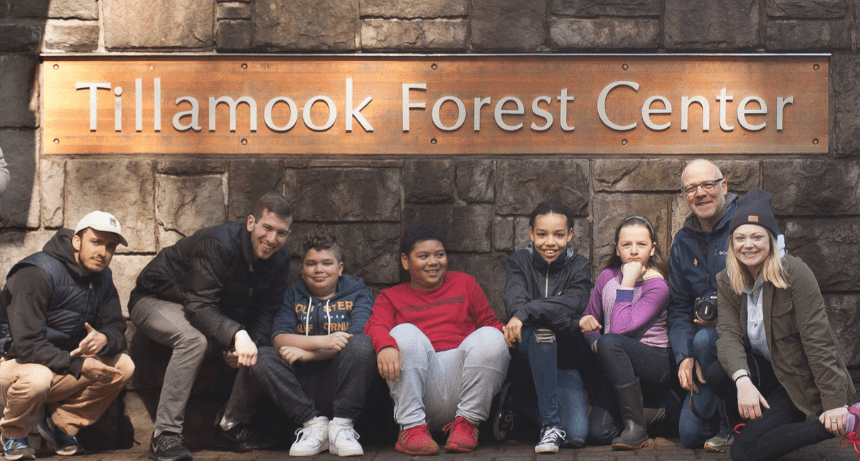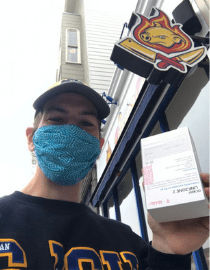
By Andrew Cohen
For Berkeley Law student Kevin Frazier ’22, “the internet is the new electricity — without it, you’re in the dark.”
That mindset drove him to launch No One Left Offline (NOLO), a nonprofit providing financial assistance to individuals and families struggling to pay their broadband bills. The organization is also beginning to create “NOLO Zones” at businesses in San Francisco, creating spaces with free WiFi for all.
More than 42 million Americans lack broadband, a problem exacerbated by the COVID-19 pandemic, especially with schools nationwide forced to teach students solely online. People with health problems and disabilities are increasingly reliant on internet access for telehealth sessions, as are older adults eager for maintaining contact with loved ones.
“With the internet, you’re able to learn new things, increase your productivity, and connect with more people,” Frazier says. “For a lot of folks, though, access to the internet is something they have to trade off with other essentials.”
Frazier saw this first hand before law school while leading Passport Oregon, a nonprofit that connected families in “under-natured” communities with the state’s outdoors.
“During our trips, kids and their parents were constantly weighing when they should turn their phones off, how many texts they could send, and whether they had enough data left that month to do a quick Google search,” he says. “Data caps and other barriers to full internet access were leaving these families in the digital dark.”
Springing into action
Since then, Frazier has worked to understand the political and legal barriers to internet access through his public policy studies at the Harvard Kennedy School and now at Berkeley Law. When the pandemic hit, he saw an optimal time to turn study into practice.

About a year ago, Frazier and some friends were sharing their mutual frustration about how often people complain about Bay Area inequities without taking any steps to remedy them. They set up the Neighborhood Nonprofit Platform in early 2020, with the intent of talking to community stakeholders about how they could improve local neighborhoods.
But when the pandemic struck in the midst of that outreach, it quickly clarified where Frazier’s group could intervene in a meaningful way — helping community service organizations already working with families and residents to close the digital divide.
“We learned that these organizations had identified those in need of devices, internet, and digital literacy,” he says. “They simply needed someone to help guide them in meeting those needs. That’s when our platform pivoted and fully shifted to No One Left Offline.”
NOLO has since formed a coalition of more than 20 organizations with deep connections to communities lacking broadband in the Bay Area and Portland, Frazier’s hometown.
One example highlighting the group’s approach with local organizations includes Señor Sisig, a restaurant in San Francisco’s Mission District. NOLO donated a hotspot there, equipped with a year of internet, which Señor Sisig leaves open for community members to use for quick searches, downloads, and scheduling needs.
Opportunity knocks
Soon after, the group procured 10 hotspots for Opportunity Junction — led by Berkeley Law grad Alissa Friedman ’87 — which helps motivated Contra Costa County residents find careers and achieve financial security. NOLO will soon send 80 hotspots to Every Child Oregon, which will distribute the devices to families with foster youth across that state.
“Kevin is persuasive and persistent,” Friedman says. “Because of the relationships he has developed, we at Opportunity Junction have been able to supply all our job training participants with the hotspots they need for our online training. When the pandemic hit, we pivoted to online delivery of all program elements. Were it not for NOLO, several of our trainees would not have had the internet service needed to participate and launch new careers.”
Frazier, who works with the given hotspot providers to limit potential security and privacy concerns, credits Berkeley Law’s community for donating to the cause, helping identify other coalition organizations, and honing pivotal skills.
“This has surely been the most meaningful part of my law school experience,” he says. “Launching a nonprofit has required me to lean on several of the lessons I’ve learned and practice at school. First and foremost, I’ve grown much more comfortable reading contracts, writing MOUs, and weighing the risks of various potential partnerships.”
Last summer, Frazier learned more about the digital landscape working for Cloudflare, which strives to make the internet safer and more inclusive. He split his time between Cloudflare and interning remotely with the Supreme Court of Guam.
In both positions, “it became even more clear that the law is often decades behind technology,” Frazier says. “Though people in the private and public sectors have good intentions about remedying this discordance, there’s still a lot to be done. I’m eager to continue working at the nexus of technology and good governance.”